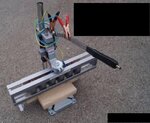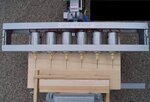Cosmosus
Newbie level 3
Hi,
I'm thinking of making a multi drill for wood drilling, that uses anywhere from 6 to 9 9V or 12V DC motors. These motors would be wired in parallel, with one battery source. I'd mount a drill chuck on each of the motors shafts for a drill bit. Now, I need a little bit of help from you. Do any of you have an experience in doing such a project?
My main concerns are drilling torque so that I could drill holes effortlessly in about 5 centimeter thick wood frames. Also, Another concern is battery life and how many volt batteries should I get? With same voltage as the motors? Are DC motors prone to overheating by working close to their full potential? My goal is to have reliable and long-lasting contraption for drilling.
Thank you very much, I wish you all a good day!
I'm thinking of making a multi drill for wood drilling, that uses anywhere from 6 to 9 9V or 12V DC motors. These motors would be wired in parallel, with one battery source. I'd mount a drill chuck on each of the motors shafts for a drill bit. Now, I need a little bit of help from you. Do any of you have an experience in doing such a project?
My main concerns are drilling torque so that I could drill holes effortlessly in about 5 centimeter thick wood frames. Also, Another concern is battery life and how many volt batteries should I get? With same voltage as the motors? Are DC motors prone to overheating by working close to their full potential? My goal is to have reliable and long-lasting contraption for drilling.
Thank you very much, I wish you all a good day!


